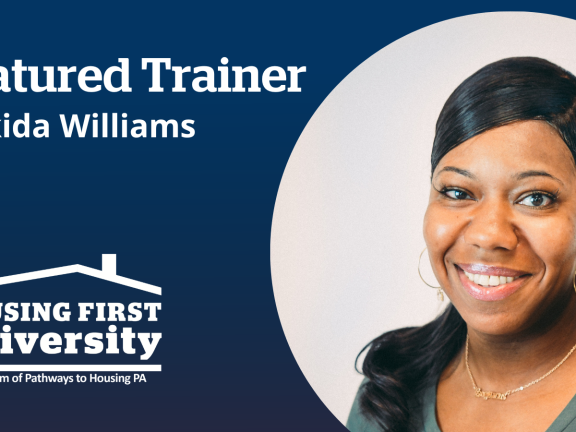Featured Trainer: Wakida Williams

Q: Tell us a bit about your professional and/or educational background.
I have a B.A. in Criminal Justice from Temple University and a M.S. in Administration of Human Services from Chestnut Hill College. Within the next two years, I plan to work towards attaining my Licensed Professional Counselor (LPC) licensure. Attaining my LPC has always been a professional goal of mine and will further support my professional development as Assistant Clinical Director at Pathways to Housing PA.
Initially, I was inspired by the legendary attorney Johnnie Cochran and wanted to become a Criminal Defense Attorney during my adolescence and throughout college. During my senior year at Temple, a close family member was incarcerated for a serious crime, and I began to view the Criminal Justice System (CJS) from a different scope. I was no longer on the outside looking in, I was on the inside looking out. The CJS practices and definition of justice conflicted with my personal/educational beliefs of what I thought the CJS was designed to do. I knew that I still had the desire and compassion to help those in need and began to explore other professional fields.
After graduating from Temple University, I landed my first job at the Juvenile Justice Center (JJC) as a Foster Care Social Worker. During my 5 years there, I learned a lot about the child welfare system. At JJC I felt like I was making a difference as I worked diligently with families of young children and adolescents, to support them with establishing goals such as reunification with their biological parent(s) or other forms of placement.
After JJC, I interviewed at Community Treatment Teams (CTT) and was hired as an Intensive Case Manager on a clinical team. I learned the bulk of my knowledge about the field of mental health here while providing intensive case management services to individuals diagnosed with serious mental illness. For almost 7 years, I worked on an interdisciplinary team providing support services to individuals within the mental health system. Those services included but were not limited to: housing, linkage to behavioral health providers, D/A referrals, 201/302 petitions, medication adherence, and accessing medical care.
In 2010, CTT adopted a new model of case management and developed Assertive Community Treatment Teams (ACT). At that time, I finished my Master’s Degree and interviewed for the Vocational Specialist position. I was hired for the role and selected to receive training in Madison, Wisconsin to learn the ACT Model and return to CTT to train additional staff. Several years later, I was promoted to ACT Clinician and stayed in that role for approximately 3 years. I received training from the Aaron Beck Institute and learned how to implement Cognitive Behavioral Therapy (CBT) and Dialectical Behavioral Therapy (DBT) with our target population.
Q: You’ve been with Pathways for over 10 years now, what’s kept you here and what roles have you had leading up to your current one?
I have been happily employed at Pathways to Housing PA for the past 10 years. I was initially hired as an Assistant Team Leader (ATL) on Clinical Team 1. It was my first entry-level management position that I’ve held throughout my years in the social work field. I am so grateful to Pathways and my current supervisor, Adam Fussaro, for the opportunity to learn and grow here. I held my position as an ATL for approximately one year before I interviewed to become a Team Leader.
In 2015, Pathways started a new team, Team 6, which was designed to provide a lower level of care to our participants prior to their discharge from services. This team focuses on higher-level goals and works toward transitioning participants to the Alumni program. I spearheaded the start of Team 6 and our Alumni program. I was later promoted to Senior Team Lead where I served as a role model for my peers by providing supervisory support and training on current clinical practices at Pathways. In September of 2022, I was promoted to my current position of Assistant Clinical Director. I work in collaboration with the Clinical Director to provide guidance and leadership to all our Clinical Teams while upholding the overall mission of Pathways.
Q: What do you enjoy about training? What topics are you most passionate about talking about?
Fun Fact: I am terrified of public speaking although I have a very approachable and friendly demeanor, most people do not know this about me! (LOL) I absolutely LOVE training my co-workers and other partners outside of Pathways. I enjoy training because I love to teach and encourage others to always be the best version of themselves. I feel that I am skilled at educating others and can break topics down in a simpler way for anyone to understand. Being a trainer/leader has always been a part of my personality and character, especially being the oldest of 3 children. I am a helper by nature and have a huge heart. I take my role as Assistant Clinical Director very seriously and am proud that I am viewed as practical and knowledgeable when supporting our staff.
I am very passionate about topics such as Housing First, Harm Reduction, Participant Advocacy, Mental Health, Disease of Addiction, and Diversity Equity & Inclusion. I feel these topics are the foundation of what we do every day as Social Workers. We fight for others who are mistreated and judged for their shortcomings. Our participants deserve a chance at stability and to work with individuals who truly care.
Q: What is something you wish more people understood about Housing First?
I wish that more people understood the guiding philosophy behind our models of Harm Reduction & Housing First. I feel as though society’s thought process is to believe that “we are providing housing to drug addicts/mentally ill, without any stipulations, who wreak havoc in society”. Beliefs such as this, in my opinion, come from the lack of understanding that poverty, homelessness, and addiction go hand in hand. You cannot address one of these issues without addressing ALL of them. Society is so easy to judge because they are from the outside looking in. The thing is, in one way or another, their tax dollars are being utilized to support those same individuals that they criticize. In order the combat the epidemic of addiction and homelessness, we must not ignore the problem because these individuals live in our communities and shouldn’t be ostracized for the issues they are struggling with. In the same way that it “takes a village to raise a child”, I think that same village should have compassion to support those affected by poverty and addiction.


